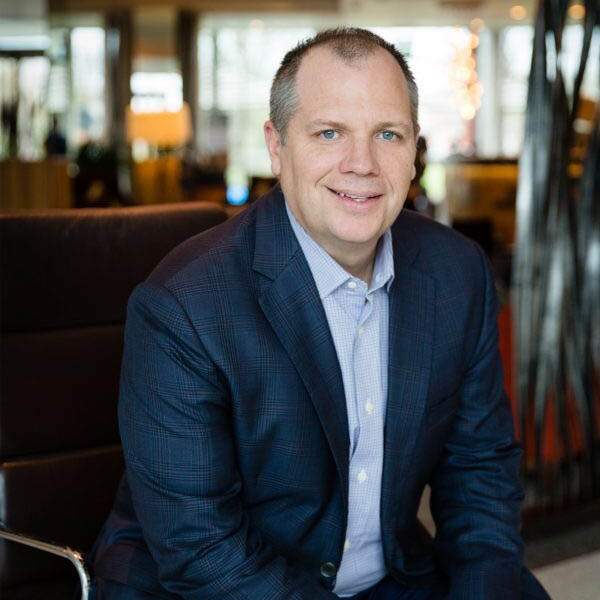19 April 2021
An interview with Mark Talbot, CEO, Redflex
Kevin Borras, Editor-in-Chief, Thinking Highways sits down with Redflex CEO, Mark Talbot. Listen to the interview here:
Transcript
Kevin Borras: Hello listeners, this is Kevin Borras, editor of Thinking Highways and Thinking Cities, and today I'm joined by Mark Talbot. Mark is the CEO of Redflex Group. Mark joins me now from Virginia on the US East Coast. Mark, how are you?
Mark Talbot: Good. Hi Kevin, how are you?
KB: I'm very well indeed, thank you for asking. It’s been an interesting past year for all of us this year—I think we'll talk about that in a minute—but specifically interesting for Redflex. Every company has dealt with a lot of unforeseen circumstances this year, but you've ended this year by acquiring the assets of a well known Israeli AI company, RoadMetric. Can you talk to me about how that came about, first of all? And can you tell me what RoadMetric brings to the table and what led you, as Redflex, to bring that company under your wing?
MT: Well, first of all, it's a terrific opportunity for us, I'm very excited about it, it will bring quite a bit of IP as well as significant talent into the Redflex portfolio. The best thing is that we've been working with them for nearly two years. So, let me step back to how we developed a relationship with RoadMetric to begin with. When I became CEO at the end of 2017, one of the things that really excited me about coming to Redflex was that I really felt we could do more than simply red light and speed enforcement. I thought we had the platform for IP and technology, that could go well beyond what we do today, to embrace the idea of, you know, refusing to stay in our lane. We're going to refuse to simply be in that one sliver of ITS and not address the auto market. So, you make some decisions when you do that. Do you build it yourself, or do you go look for partners? We had ideas about the prospects of video analytics, we looked at some really smart companies, we struck up a great relationship with RoadMetric, we admired both their talent and culture, and we started working together. We did a couple of pilots together with customers, they were very successful, and we were very impressed with their product and their people. That progressed over the course of 18 months, then it came to a point where the markets that we were looking at, I thought, were developing more rapidly. I thought by owning VIP, we really created agency over the direction the company can take with that platform as we explore the broader ITS market. That was the strategic positioning, but it really started with a great working relationship and the successful deployment of their product, so we were very comfortable with what we were getting.
KB: Yeah, that's the important thing isn't it, that the personal side of it works as well. You know, it's not just your client, the assets of the company or building or people it's the thing as a whole isn't it?
MT: Absolutely, it certainly de-risks a big part of any type of merger acquisition of a company when you're bringing the people along as well. So that was one box we could check off easily and then, of course, you checked off the box with the technology that can go to market with today. But again, we are always looking two years down the road and we're seeing the market become more active and believe their products, their IP, can be a real compliment to what we have today, and potentially be products in their own right as we expand into the broader ITS market.
KB: So how did you come to work with them in the first place? Was it one of those things that is just serendipity? I know so many good business partnerships that have happened over coffee at Intertraffic or ITS Australia, where people just end up chatting and think, well, I can work with you. That’s happening so often—it sounds trivial—but it’s happened hundreds of times that I know of.
MT: Well, we have a very good business development and solutions team who are active in the marketplace, active at Intertraffic, active globally. So we’ve got a good view of what's happening in the industry and knew what we wanted to find. We wanted to find someone that had video analytics capability that was forward-leaning as far as where the products were going, wasn't stale, and was developing already at the time we were talking to them. Look, you do the analysis. Do you build or buy? And at that point, we said let's go get this today because we can deliver it to customers today. And then at that point, we knew it was something we could leverage going forward.
KB: Obviously, the technology side of what RoadMetric do is really important. But can you explain to the uninitiated amongst the listeners, what does RoadMetric do that come that complements what you do? People know Redflex as an enforcement company—whether that's true or not these days—but I know you're much more than that.
MT: Look, we're unique in that, for the last 20 years, we've operated in a very significant sliver of the ITS space which is compliance and enforcement. But at the end of the day, we're a technology company. We build a sensor, we build a device that actually does a very specific purpose, which is either speeding enforcement, red-light enforcement or, bustling enforcement. But if you deconstruct that, within that are some very powerful tools around identifying and in observing traffic and pulling data off the street, to potential decision-making applications or for people. Yes, RoadMetric is a video analytics company, they're able to take images from streaming video from vehicles that are in motion, and actually, see what's happening. That technology is very specific and it's complicated. The general concept of this is that we have a very powerful sensor, using a fairly low-cost edge system, which is a video camera, or high def camera, and taking those images and start making sense of them. When you think about that, and you think about our current sensor, which is doing something very specific—highly regulated, speed enforcement—you start seeing the complementary benefits that can improve your yield. You can improve your overall acquisition of data and the effectiveness of acquiring data with another sensor. That's the immediate complement to what we do today. Then when you talk about in-motion, or other ways that you can deploy video to look at traffic to understand what's happening—bustling enforcement, pedestrian bike and vehicle conflict at the intersection, traffic observation and management, incident detection—you start thinking about ways that you can deploy at a lower cost higher value sensors, with this powerful engine that can evaluate and interpret the data.
KB: So, if we're going to caption this interview, basically, it's understanding traffic. That's what it's all about. Understanding what you see, correct? Now, the other thing I was going to talk about was that, although you are joining us from the States, you are an American, Redflex, of course, are an Australian company. So how important to Redflex is your company's Australian identity?
MT: Critical. It's where the IP has come from. From our history in the enforcement business, it is a well established and mature market. It also reflects many other international countries that follow similar business models to Australia, that aren't the same as the US. So, quite frankly, the fact that we can extend from Australia into Europe, into the Gulf, into North America, is critical. And again, our intellectual capital is coming out of Melbourne. It's coming out of Australia.
KB: You may think this is an odd question. Do you think companies have from different countries have different personalities? Do you think that Redflex would be a different company, or perhaps would work in a different way if you were Canadian or Dutch?
MT: I think every country has a culture around work. I think I think the common goals of growing the business, growing it profitably for shareholders, being innovative... these are universal. These are not unique to any one industrialised nation. So, when you find commonalities we can all work and march towards, it makes a lot easier to work across borders.
KB: So, a year ago, none of us could have predicted what's happened in 2020 business-wise. How has the pandemic affected your company and its ability to do its job? How has it affected the market you're in? And how much did it affect the acquisition of RoadMetric?
MT: Well, let's talk about what happened. As soon as the pandemic became widely publicised, or was inevitable, we were running into an issue. You saw the immediate shutdowns, you saw them via quarantining that restricted mobility and had a dramatic impact on us as a business, mainly just administratively. People couldn't go to the office, we had to set up remote working, we had to figure out how we're going to engage with clients. I think initially, we probably spent the first three weeks trying to figure out what does this mean? What does it mean that we all have to now work from home? Luckily, in most countries, transportation was quickly recognised as an essential service. To the point that in many cases, because the road traffic had dropped, construction actually proceeded where it could be afforded more aggressively because you didn't have all the traffic management restrictions that go on when you're doing road work.
Initially, it was concern but then quickly, we saw a lane to operate in. From there we’ve just been progressing. There is, without question, additional latency in the system, as far as new business awards, expansion of programs, implementation of programs. But for those businesses that were up and running, in the midst of delivery, we really did work with clients to continue. It really was up to us in the first month to ensure that we, as Redflex, could deliver all the services required under our contracts, given the heavy restrictions on mobility and where we work and how we work. It was really up to us. And that was our goal, we needed to make sure that we could deliver on our contracts, that's all we knew we could do. And then, subsequent to that, we realised that our customers could progress, they were given essential service licences, and we've been moving forward.
KB: For a company like Redflex, your revenue is generated by drivers doing things wrong. It's enforcement, you're enforcing red light cameras, you're enforcing all kinds of offences. So, with the traffic levels massively down in the early part of lockdown, March and April, traffic in the UK was down 60, 70, 80 per cent in some cases. How did that affect the company going forward? Was that a difficult time? Or was that always under control?
MT: It's marginal. Only probably 15 per cent of our revenue is subject to volume. It had an impact, of course, any revenue loss has an impact, but it was manageable. I'd say within 60 days, from March, April into May, you saw a 60% recovery. Then we plateaued to where we are today and I'm talking specifically in the USA, where have the most data, we’re seeing probably somewhere 85% recovery of traffic volume. It’s interesting, violations were up as a percentage of traffic. So it seemed to, quite frankly, a space was created. People will return to speeding or running red lights. That was an interesting data point to see that a drop a volume didn't necessarily create safer streets.
KB: I think you're right and the human behaviour experts are having a field day with who drove during the lockdown. People were driving shorter distances, but faster, and the police were issuing more speeding fines with 60% less traffic… extraordinary.
MT: If you take anything away from this, it should be the data that happened during that very unusual time in the world and in our lives, the data from the roadways. What is really interesting to me is the data from vehicle emissions, and the improvement of the air quality. Previously, that was only something you could model. Now you have actual, real data to look at. When you talk about ITS, we're about reducing congestion, improving roadway safety, and then and then minimizing the impact of vehicle emissions. So, that data is going to be tremendous and I hope I hope it can influence policy going forward.
KB: Well, yes, that has to be the goal. So the next step is make use of this extraordinary new data. Excellent. So Mark, thanks for your time, and good luck with everything. I hope next year brings us all a hugely better working environment and personal environment. But thanks for your time.
MT: Thanks, Kevin.
Featuring

Mark Talbot
Group Chief Executive Officer / Redflex
Mark was appointed as Group Chief Executive Officer of Redflex on 21 August 2017 and Managing Director on 29 November 2017.
Prior to joining Redflex, Mark was the General Manager of State and Local Solutions of Conduent (formed through a divestiture from Xerox Corporation). Prior to this role, Mark spent nine years in Xerox’s Transportation Sector segment rising to Group President Americas managing a portfolio of transportation related businesses before becoming Global Sales Leader for the entire Transportation Solutions Group with annual revenue in excess of US$850 million.
Mark has extensive experience in product development, sales and strategy in the Intelligent Transportation Services market and has operated effectively throughout the major markets in the world.
Mark holds a Bachelor of Science from Catholic University of America and a Masters of Business Administration from the University of Maryland.


Kevin Borras
Editor in Chief / Thinking Highways
Kevin is one of the two co-founders of H3B Media, launched in 2006. He launched Thinking Highways in October '06, then Thinking Cities in November 2012. In 2018, Kevin rebranded the company as H3B Connected to more accurately reflect its changing role in the ever-evolving media solutions sector. H3B specialise in creating bespoke media solutions for the smart city and intelligent transportation markets.


